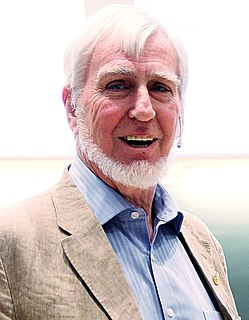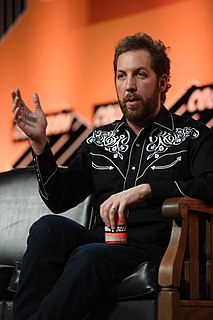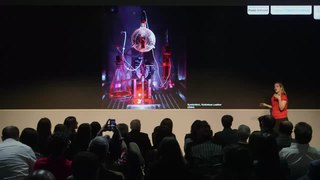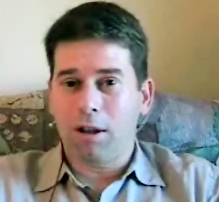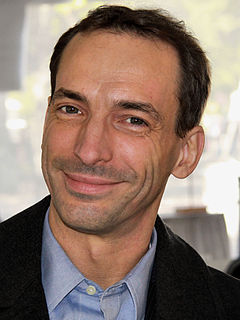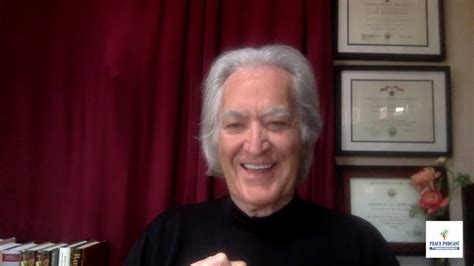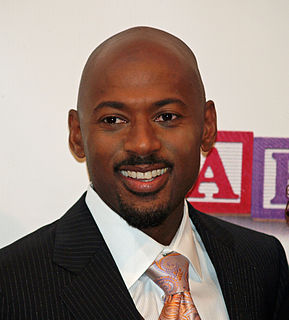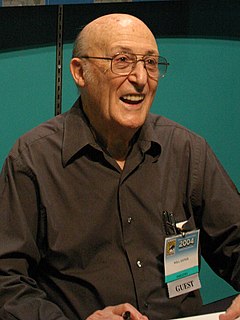Top 356 Cognitive Quotes & Sayings - Page 5
Explore popular Cognitive quotes.
Last updated on November 24, 2024.
One of the things cognitive science teaches us is that when people define their very identity by a worldview, or a narrative, or a mode of thought, they are unlikely to change-for the simple reason that it is physically part of their brain, and so many other aspects of their brain structure would also have to change; that change is highly unlikely.
Human beings have a variety of intelligences, such as cognitive intelligence, emotional intelligence, musical intelligence, kinesthetic intelligence, and so on. Most people excel in one or two of those, but do poorly in the others. This is not necessarily or even usually a bad thing; part of Integral wisdom is finding where one excels and thus where one can best offer the world one's deepest gifts.
I did grow up in a military family but lacked the perspective to grasp the cognitive dissonance carried by most people who serve in the armed forces or the circumstances that push lots of folks into the military. I don't blame G.I. Joe or Rambo for that atmosphere, but they certainly reflected the final stage of a two generation cultural myth.
I visited a Child Friendly Space where children take part in structured play and development activities in a safe environment. These are designed to develop their cognitive ability as well as address their psychosocial needs. As I watched them sing songs and take part in games, it struck me that these kids could be anywhere in the world.
The first principle of cognitive therapy is that all your moods are created by your 'cognitions,' or thoughts. A cognition refers to the way you look at things - your perceptions, mental attitudes, and beliefs. It includes the way you interpret things - what you say. about something or someone to yourself.
At a conference of sociologists in America in 1977, love was defined as "the cognitive-affective state characterized by intrusive and obsessive fantasizing concerning reciprocity of amorant feelings by the object of the amorance." That is jargon - the practice of never calling a spade a spade when you might instead call it a manual earth-restructuring implement - and it is one of the great curses of modern English.
Every mutation through a new combination of genetic factors that provides the organism with a new opportunity for coming to terms with the conditions of its environment signifies no more and no less than that new information about this environment has got into that organic system. Adaptation is essentially a cognitive process.
Cognitive neuroscience is entering an exciting era in which new technologies and ideas are making it possible to study the neural basis of cognition, perception, memory and emotion at the level of networks of interacting neurons, the level at which we believe many of the important operations of the brain take place.
I think it started to feel like home when I stopped maintaining any pretense that I was ever going to be in the movie business. I went there like many writers - I had a screenplay deal and I would go to these meetings and it was the typical thing. And I hated it. I was not interested in writing screenplays, actually. But I kept feeling like that was what I was supposed to do. It was just this horrible cognitive dissonance.
The Freudian tradition will never completely die because it has a few good points. For example, people have motives and thoughts of which they are unaware. Most of cognitive therapy has now adopted a similar idea. On the other hand, the relationship part of psychoanalysis - where you must have a deep, emotional relationship with the client - will, I think, get kicked in the teeth one of these days.
From the social cognitive perspective, it is mainly perceived inefficacy to cope with potentially aversive events that makes them fearsome. To the extent that people believe they can prevent, terminate, or lessen the severity of aversive events, they have little reason to be perturbed by them. But if they believe they are unable to manage threats safely, they have much cause for apprehension.
Of course, the toxic bullshit of incessant advertising and show biz for nearly a century has stripped us of cognitive abilities for dealing with reality that used to be part of the normal equipment of adulthood - for instance, knowing the difference between wishing for stuff and making stuff happen. We bamboozled ourselves with too much magic.
Because those who hold conspiracy theories typically suffer from a crippled epistemology, in accordance with which it is rational to hold such theories, the best response consists in cognitive infiltration of extremist groups. Various policy dilemmas, such as the question whether it is better for government to rebut conspiracy theories or to ignore them, are explored in this light.
I think that in order to achieve progress in the study of language and human cognitive faculties in general it is necessary first to establish 'psychic distance' from the 'mental facts' to which Köhler referred, and then to explore the possibilities for developing explanatory theories... We must recognize that even the most familiar phenomena require explanation and that we have no privileged access to the underlying mechanisms, no more so than in physiology or physics.
Cognitive skills such as big-picture thinking and long-term vision were particularly important. But when I calculated the ratio of technical skills, IQ, and emotional intelligence as ingredients of excellent performance, emotional intelligence proved to be twice as important as the others for jobs at all levels.
I do think that an understanding of contemporary work in the cognitive sciences has a profound effect on how one views the workings of the mind. It doesn't work the way we pretheoretically think it does. Such an understanding, of course, should have a large effect on one's views in philosophy of mind, but also in epistemology.
The abbreviations (e.g. NATO, UN, USSR - E.W.) denote that and only that which is institutionalized in such a way that the transcending connotation is cut off. The meaning is fixed, doctored, loaded. Once it has become an official vocable, constantly repeated in general usage, "sanctioned" by the intellectuals, it has lost all cognitive value and serves merely for recognition of an unquestionable fact.
Hardships of early human life favored the evolution of certain cognitive tools, among them the ability to infer the presence of organisms that might do harm, to come up with causal narratives for natural events and to recognize that other people have minds of their own with their own beliefs, desires and intentions.
When it comes to the mental world, when we design things like health care and retirement and stock markets, we somehow forget the idea that we are limited. I think that if we understood our cognitive limitations in the same way that we understand our physical limitations … we could design a better world.
The day after Donald Trump was elected, Chinese business leaders, including the heads of Baidu, stood up and gave a speech saying, 'Come to China and build your company now.' The cognitive dissonance of that was amazing for some of us to think we might be losing our leadership role in building companies.
As the nature deficit grows, another emerging body of scientific evidence indicates that direct exposure to nature is essential for physical and emotional health. For example, new studies suggest that exposure to nature may reduce the symptoms of Attention Deficit Hyperactivity Disorder (ADHD), and that it can improve all children's cognitive abilities and resistance to negative stresses and depression.
I know we can all remember the days of sitting in algebra class asking ourselves, 'why will I need algebra or chemistry in the future?' The answer was and still remains that advanced math and science classes help high school students develop their analytical and cognitive skills and better prepare them to compete in college and the workplace.
The fact that we have been able to develop a successful science, which issues in ever more accurate predictions and broader explanations, is the real ground for confidence that we are in a position to gain knowledge of the world around us. At the same time, one might ask how it is that the cognitive equipment we have came about, and here, no doubt, our evolutionary origins are relevant.
People think that design is styling. Design is not style. It's not about giving shape to the shell and not giving a damn about the guts. Good design is a renaissance attitude that combines technology, cognitive science, human need and beauty to produce something that the world didn't know it was missing.
Busy people all make the same mistake: they assume they are short on time, which of course, they are. But time is not their only scarce resource. They are also short on bandwidth. By bandwidth I mean basic cognitive resources - psychologists call them working memory and executive control - that we use in nearly every activity.
Some international relations scholars would posit that interest in zombies is an indirect attempt to get a cognitive grip on what U.S. Secretary of Defense Donald Rumsfeld famously referred to as the "unknown knowns" in international security. Perhaps, however, there also exists a genuine but publicly unacknowledged fear of the dead rising from the grave and feasting upon the entrails of the living.
To summarize, using money to motivate people can be a double-edged sword. For tasks that require cognitive ability, low to moderate performance-based incentives can help. But when the incentive level is very high, it can command too much attention and thereby distract the person’s mind with thoughts about the reward. This can create stress and ultimately reduce the level of performance.
I don't think comics use iconic forms - or they don't have to. But that makes them even more "cool," if I understand the idea. One has to be quite involved to make comics work. Signals have to be decoded on both the verbal and visual level, simultaneously, and the reader must do a lot of cognitive work between panels as well. Comics definitely need an engaged reader.
The part of the brain most affected by early stress is the prefrontal cortex, which is critical in self-regulatory activities of all kinds, both emotional and cognitive. As a result, children who grow up in stressful environments generally find it harder to concentrate, harder to sit still, harder to rebound from disappointments, and harder to follow directions. And that has a direct effect on their performance in school.
The elegant study... is consistent with the themes of modern cognitive neuroscience . Every aspect of thought and emotion is rooted in brain structure and function, including many psychological disorders and, presumably, genius. The study confirms that the brain is a modular system comprising multiple intelligences, mostly nonverbal.
I think a lot of voters have certain cognitive dissidence. Donald Trump is getting social conservatives, economic conservatives, some Libertarian, some supply side conservatives, debt hawks. The conservative and Republican base is not monolithic. It has subsets that he seems to be appealing to all of them.
The cognitive structure does not generate consciousness; it simply reflects it; and in the process limits and embellishes it. In a fundamental sense, consciousness is the source of our awareness. In other words, consciousness is not merely awareness as manifest in different forms but it is also what makes awareness possible.
In general, I'm in support of promoting art and science in public schools. I think music and science are probably the most important factors for the human brain developing. Even more so than any other fields, because music covers mathematics, cognitive reasoning, motor skills, coordination, like, it's kind of everything.
Cognitive therapy is based on the idea that when you change the way you think, you can change the way you feel and behave. In other words, if we can learn to think about other people in a more positive and realistic way, it will be far easier to resolve conflicts and develop rewarding personal and professional relationships.
Coming from a background as unique as mine, the first challenge is being able to identify chaos as chaos. For the first half of my life, I interpreted chaos as normal. Today, I am aware that I have triggers: a default way of thinking that is often not relative to the immediate moment. Therefore, in the midst of chaos, I have learned to relinquish all my premature cognitive commitments and become present.
Since the idea that modification of synaptic function can provide a basis for memory arose shortly after the first anatomical description of the synapse a number of models (Hebb 1949 . . Hayek 1952 . . Kendel 1981) have been proposed in which various cognitive activities are represented by combinations of the firing patterns of individual neurons.
Lakoff's idea is that most of our thought is guided by underlying conceptual mappings between two domains that share some content, that overlap in the sets of their attributes. ... Contrary to the assertions of Lakoff and some of the cognitive metaphor theorists, people can read through to an underlying mapping, but only when the surface metaphor is new to them.
When my disease nearly destroyed me in 2009, my doctors thought I'd be lucky to regain 80 percent of my cognitive abilities. When I was at my sickest, I couldn't read or write. I could barely walk on my own or groom myself. The disease felled me physically and mentally - robbing me, briefly but intensely, of my wits, my sanity, my memory, my self.
Novels institutionalize the ruse of eros. It becomes a narrative texture of sustained incongruence, emotional and cognitive. It permits the reader to stand in triangular relation to the characters in the story and reach into the text after the objects of their desire, sharing their longing but also detached from it, seeing their view of reality but also its mistakenness. It is almost like being in love.
Space and force pervade language. Many cognitive scientists (including me) have concluded from their research on language that a handful of concepts about places, paths, motions, agency, and causation underlie the literal or figurative meanings of tens of thousands of words and constructions, not only in English but in every other language that has been studied.
The new way of thinking, spawned by the cognitive revolution, shows strong promise. Reversing previous doctrine in science, the new paradigm affirms that the world we live in is driven not solely by mindless physical forces but, more crucially, by subjective human values. Human values become the underlying key to world change.
Still,[...] in all forms of comics the sequential artist relies upon the tacit cooperation of the reader. This cooperation is based upon the convention of reading and the common cognitive disciplines. Indeed, it is this very voluntary cooperation, so unique to comics, that underlies the contract between artist and audience.
Of all the systems of the body - neurological, cognitive, special, sensory - the cardiological system is the most sensitive and easily disturbed. The role of society must be to shelter these systems from infection and decay, or else the future of the human race is at stake. Like a summer fruit that is protected from insect invasion, bruising, and rot by the whole mechanism of modern farming; so must we protect the heart.
We already know that kids who get put in front of TVs instead of interacting, this is not good in all kinds of ways. And it's just not good for their cognitive - it's not good for their social development - I mean, that is incredible that kids in kindergarten... We should be moving away from screens at all levels of education, not moving into them.
Mind mapping is a technique based on memory and creativity and comprehension and understanding, so when the student or a child uses the mind map, they are using their brain in the way their brain was designed to be used, and so the mind helps them in all learning and cognitive skills. It simply helps them in what the brain does naturally.











